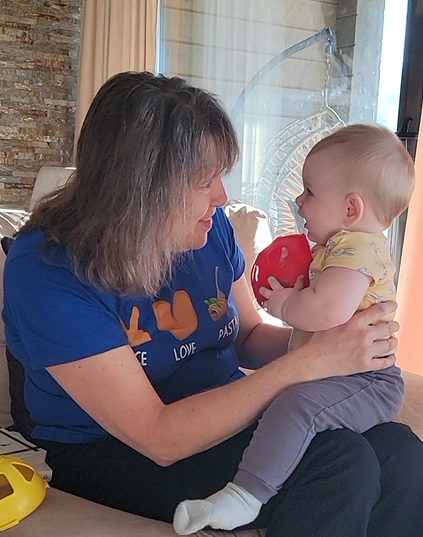Cry, Pray, Yearn, Hope

“Cry, Pray, Yearn, Hope” – October 27th, 2024 (Psalm 130)
Introduction
The first Hebrew word in today’s Pilgrimage Psalm, Psalm 130, mimma‘ămaqqîm, is translated, “out of the depths.” The depths are dangerous waters, like those we just saw from the 2000 disaster drama film, The Perfect Storm, based on Sebastian Junger’s creative non-fiction book of the same name. It tells the story of Andrea Gail, a commercial fishing vessel that was caught in what has become known as “the Perfect Storm of 1991.” I think it’s a fair statement that most people have a healthy fear of the ocean at the best of times. Junger writes, “Anyone who has been through a severe storm at sea has, to one degree or another, almost died, and that fact will continue to alter them long after the winds have stopped blowing and the waves have died down.”
As we take a closer look at Psalm 130 today, we will discover four invitations from God. Psalm 130 beckons all of us, even those who are despairing of life, even those who are drowning in the chaos, even those who feel separated from God to respond to these four invitations: to cry to God, pray to God, yearn for God, and hope in God. We will look at each of these in turn, each one followed by a one-minute period of contemplation and responding to the Lord.
Cry
Psalm 130:1 – “1 Out of the depths I cry to you, O Lord.”
Psalm 130’s first invitation from God is to cry to God. The psalmist, by placing “out of the depths” first, is emphasizing his crisis, despair of life, feeling of fear, and sense of separation from God. “The depths” here describe the great distance the psalmist feels between himself and the Lord. We are not told exactly what the psalmist’s troubles were. Maybe the psalmist was sinking in the depths of his sin, which he knew full well was incompatible with God’s holiness. Staying in the swirl of sin and guilt could have swallowed him up and sucked the life out of him. Maybe the psalmist was overcome with grief and loss and unresolvable questions. Allowing the trauma and confusion and sadness to swamp him could have overtaken his soul and kept him from choosing to love again. Maybe the psalmist was worn out from constant attacks from enemies on every side and unable to catch a break. Being isolated in battles where he desperately needed reinforcements could have left him debilitated or even incapacitated. The psalmist omits any details of his calamity, which invites us along with countless sufferers down through the centuries to cry out to God using the very same words of this psalm, no matter what precise troubles we face.
And yet, from out of the depths, our psalmist cries to the Lord. Notice that he does not cry out against the Lord. He does not cry out about the Lord. He cries out towards and to the Lord. He says, “I cry to you, O Lord.” This is an act of faith in God. At the lowest point in his life, in the hour of his deepest need, he was convinced that God would hear and respond to his cry, and so he cried to the Lord.
A couple of weeks ago I asked us to consider, When was the last time you let yourself laugh loud and long, with peals of laughter? Today, let us consider, When was the last time you allowed yourself to have a good, hard cry, where you didn’t even try to hold back your emotions or tears? God made both laughter and crying as release valves for our souls. But we need more than just crying. Crying, in and of itself, only wears us out. Crying leaves us feeling parched and dry, in our throats and in our souls. It’s not just the act of crying that is needed. Many scriptures encourage us to cry to God, and especially to my God.
Psalm 5:2 – “Listen to the sound of my cry, my King and my God, for to you I pray.”
As we pause to contemplate and respond to the Lord’s first invitation, let us cry to God together.
Pray
Psalm 130:2-4 – “2 Lord, hear my voice! Let your ears be attentive to the voice of my supplications! 3 If you, O Lord, should mark iniquities, Lord, who could stand? 4 But there is forgiveness with you, so that you may be revered.”
Psalm 130’s second invitation from God is to pray to God. There is a subtle shift in the first two verses of Psalm 130 which is easy to miss in the English. The word translated “Lord” shifts in the Hebrew from Yahweh in verse 1 to Adonay in verse 2. While Yahweh means “the Lord,” Adonay is more personal. Strong’s exhaustive concordance notes that in this case, the emphatic form of Adonay used here is best translated, “my Lord.” The psalmist calls on my Lord to hear him. In asking my Lord to hear my voice, the psalmist is making a strong emotional appeal to the Lord to hear his cry and to respond with favor.
Now, for a short historical detour. It was very common in the cultures of the Ancient Near East to ask one’s god or gods to hear a prayer. If we were to visit a collection of Ancient Egyptian stelae (those stone slabs with hieroglyphics), we might notice some unusual decorations. It was believed that a request to a god to “hear this prayer” would be made more effective by adding engraved ears in generous proportions and quantities (376 ears in one case). Engravings of deities with notably large ears emphasized the hope that these gods would be attentive and ready to listen. That God attentively listens and responds to us was a proof of Yahweh’s divinity. The Bible was written by and for people who understood that the one true God, Yahweh, has ears to hear our prayers.
Psalm 17:6 – “I call upon you, for you will answer me, O God; incline your ear to me, hear my words.”
Mark 4:9 – “And he [Jesus] said, ‘Let anyone with ears to hear listen!’”
Back to Psalm 130. In verse three, the psalmist poses a rhetorical question asking, Who could stand before the Lord if God marked iniquities. It is true that God does indeed keep a comprehensive record of our sins, simply because God sees all. But because forgiveness belongs to God, because God is a forgiving God, God chooses to not remember our sins, which means that they are not counted against us. I devised this simple mathematical equation to help us to understand this:
b = ∞ – s,
where b is how much we are beloved, and s is the number of our sins. No matter how large our tally of sins, God’s love for us is always boundless, without limit, infinite!
God’s love for us can not be diminished by our sins.
The psalmist tells us in verse four the outcome of God’s forgiveness. God’s message to humanity from start to finish has always been: In me is life: choose life! Jesus affirmed this in John 10:10b, “I came so they can have real and eternal life, more and better life than they ever dreamed of.” God created life, and God created us for life together in the eternal embrace of the Trinity. God, the forgiving God, desires that we would be restored to life, real and eternal life, more and better life than we ever dreamed of. And that results in God being revered!
As we pause with a song, let us pray to God together!
Yearn
Psalm 130:5-6 – “5 I wait for the Lord, my soul waits, and in his word I hope; 6 my soul waits for the Lord more than those who watch for the morning, more than those who watch for the morning.”
Psalm 130’s third invitation from God is to yearn for God. You knew there would be at least one grandbaby story in this sermon, right? Our precious granddaughter is right on the cusp of crawling. She can maneuver herself into any position from any other. She can scoot backwards with ease. She can go from her tummy to her bottom and back again. The only thing keeping her from reaching whatever she wants is coordinating arm and leg movements on her forward crawl. She will lie on her tummy and lock eyes on her target. You can read her thoughts on her face: “That’s what I want. And now I’m going to go get it.” She then begins to pump all of her limbs simultaneously. Would that any of us could do such a workout! She gets an A+ for enthusiasm, effort, and joy, but unfortunately, all that gusto doesn’t get her any closer to her goal. As a securely attached and confidently beloved child, she puts her whole heart into it. She goes “all in” whenever she yearns for something or someone. That is actually a pretty good picture of how God wants us to yearn for him. We don’t have to have all our stuff together. We don’t need to have any techniques down. God wants us to know that we are secure and beloved in him. God wants us to be wholehearted in our pursuit of him. We can go “all in” with our trust in God, yearning for God, placing ourselves and our needs into God’s loving hands.
The psalmist says we are to wait for and hope in the Lord even more than those who watch for the morning. This is the kind of watching when the night is as black as pitch and you long for even a faint flicker of light to bring you relief; when you’re stuck in a sinister shroud of darkness where troubles and dangers seem to ambush you one after the other; when you’re beset by a sinister sleeplessness with sights, sounds, and senses that strike your heart with fear. The psalmist wants to assure us that no matter how bad things look, we can have intense yearning for God and confident hope that God is with us and will help us, right where we are.
Lamentations 3:22-23 – “The steadfast love of the Lord never ceases, his mercies never come to an end; they are new every morning; great is your faithfulness.”
As we pause with a song, let us yearn for God together!
Hope
Psalm 130:7-8 – “7 O Israel, hope in the Lord! For with the Lord there is steadfast love, and with him is great power to redeem. 8 It is he who will redeem Israel from all its iniquities.”
Psalm 130’s fourth and final invitation from God is to hope in God. The psalmist’s renewed hope in the Lord becomes contagious here. It reminds me of a scene in one of my favorite films. A desolate man has been washed up on the shore of an uninhabited island in close proximity to a large city. He stares blankly at the river’s edge, his cell phone battery having given up all charge, even as he has given up all hope. He notices a change in the gentle lapping of the waves. The waves grow a little bigger, a little more frequent, and the man suddenly realizes a large boat is about to pass by. His despair begins to dissipate, as the dawn of hope breathlessly illuminates his face. That’s what it’s like when someone lives out loud and openly with vibrant hope in the Lord! Vibrant hope in God sets into motion concentric circles of confidence in God that awaken hope in others, too!
The psalmist’s call to others includes the key Hebrew term, checed, a term that carries the connotations of steadfast love, favor, faithful love, loyal love, loving-kindness, merciful kindness, mercy, and beauty. This term is one of the words God spoke as an assurance of “This is who I am” to Moses on Mount Sinai, Exodus 34:6 – “The Lord, the Lord, a God merciful and gracious, slow to anger, and abounding in steadfast love and faithfulness.”
Verse seven assures us that “with the Lord there is steadfast love.” Notice what the Psalmist does not say. He does not say, “For with the Lord there” might be steadfast love, if we’re lucky. He doesn’t say, “For with the Lord there” could have been steadfast love, if you guys hadn’t messed things up so bad. The psalmist has come to know the Lord as one who is not just possibly or unpredictably faithful and forgiving, but as one who is faithful and forgiving. God’s character, who God is, is unchanging, reliable, secure, firm. It is with this level of confidence that the psalmist calls to others to join him in placing their hope in God. Not only is God faithful and forgiving, but God is also the one with whom there is great power to redeem!
Notice that in Psalm 130 we are not told that God will redeem us from our troubles, as long as we didn’t cause those troubles ourselves. Imagine if, when you called 911, these community heroes showed up, and, instead of asking Where does it hurt? they asked, What stupid thing did you do to get yourself into this pickle? No, first responders respond with competency and care, no matter how previous circumstances unfolded. There will be time to untangle and sort those out later. The psalmist actually names the worst possible scenario from which God will redeem – from “all of their iniquities.”
Psalm 130 assures us that no matter what we have done, whether through iniquity, ignorance, sin, or stupidity, God does deliver us from trouble. God is a God, not of condemnation, but of redemption. The psalmist calls to us to trust God not only when we find ourselves in the depths or in times of trouble, but to hope in God as a way of life!
As we pause with a song, let us hope in God together!
Conclusion
Psalm 130 beckons to us in all kinds of seasons. Here are a few of the ways in which Psalm 130 has been used in Jewish and Christian traditions:
- It is recommended to be read on the birth of a child with a disability, special need, or challenge, as a reminder that God’s steadfast love is unconditional.
- It is one of three psalms recommended to be read in the presence of a dying person.
- It is one of four psalms recommended for reading in times of tragedy or crisis.
I think it’s pretty awesome that in this series on the Pilgrimage Psalms, we “just happen” to be taking a close look at this particular Psalm on this particular day. I receive this as a kiss from God, to realize that today the Lord is reminding us that God is with us in every kind of season, in the highs as well as in the lows. Today marks the first anniversary of when y’all installed me as your Pastor. Thank you from the bottom of my heart! I truly consider it an honor to journey closely with each of you in this way.
I feel pretty confident that in the past couple of years, many if not most of us would have described the grief and loss we’ve been through as a church with words like “crisis,” “tragedy,” even “in the depths.” I am in awe of how God has brought us as a church through some very difficult times. And I am in awe of how God has redeemed so much of our grief and loss. In some very painful and broken places, God has brought much healing and restoration and life.
Of course, we individually and together have a long way to go, but so many lives have been touched and changed because of Christ’s faithfulness to us and because of your faithfulness to Christ. We have together, in Christ, by the power of the Holy Spirit, done myriads of small things with great love. Let’s thank and praise the Lord for the new ways in which God has empowered us to together engage the world around us this past year: Music and Ministry at Meadowbrook, Pet Blessing, Rivers Alive, Midweek Prayer, Welcome Baskets for new neighbors, Market Day with Ms. Vick, Care Packages for Camporee, Prayer for the Persecuted Church, Vineyard Worship Circles, One Roof Co-op donations, Distribution of 100 boxes of corn chips (remember those?), Quads with Karen, Saying Hey from Far Away … All glory to God! These small things done with great love are what changes the world.
When we find ourselves in the depths, or when we don’t know how to respond to individuals or even nations in the depths, let us remember who God is. No matter how bad things look, God is always merciful and gracious. No matter how we feel, God is always slow to anger. No matter how bleak the outlook, God always abounds in steadfast love and faithfulness. Let us cry to God, pray to God, yearn for God, and hope in God. For with the Lord there is steadfast love, and with God is great power to redeem!




